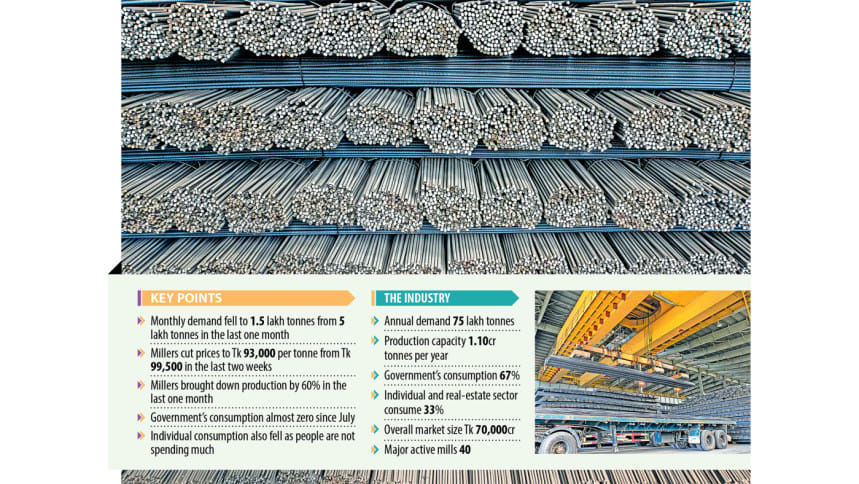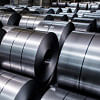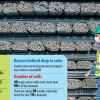Millers bring down steel production as demand falls

The country's steel production fell significantly in September compared to the previous year as the industry reeled from a damaging slump in demand and subsequent price reduction.
Amid nationwide protests, curfews, a political changeover and ensuing uncertainty, the past three months have been brutal for the local steel sector, with top suppliers like Bangladesh Steel Re-Rolling Mills Ltd (BSRM) and Anwar Ispat warning of increasingly bleak conditions.
As mills faced losses on every tonne of steel they made, many lately opted to shut down their furnaces.
"Millers are now selling products below production cost to cover staff salaries and utility bills," said Tapan Sengupta, deputy managing director of BSRM.
Public construction and government mega-projects, accounting for around 67 percent of the local steel demand, have been declining since July this year and came to a grinding halt after the August 5 political changeover.
To clear the inventory, steel manufacturers have reduced prices by nearly Tk 6,000 to Tk 6,500 per tonne in the past month to cover operating expenses
Meanwhile, the real estate sector has also been struggling due to persistent high inflation, further impacting steel demand.
Besides, new individual constructions in semi-urban and rural areas have been stalled as local public representatives fled during the political changeover, leaving the official approval processes in limbo.
According to sector people, combined sales of local steelmakers have dropped to 150,000 tonnes per month since July, down from over 500,000 tonnes per month previously.
"There is no demand like before, so we are forced to sell our finished inventory at a loss," said Sengupta.
To clear the inventory, steel manufacturers have reduced prices by nearly Tk 6,000 to Tk 6,500 per tonne in the past month to cover operating expenses.
According to the Trading Corporation of Bangladesh (TCB), 60-grade mild steel (MS) rod is being sold at Tk 93,000 per tonne, down from Tk 99,500 per tonne just a month ago.
"Steel usage is on a downward trend, making it difficult for millers to continue production at full capacity," said Manwar Hossain, former president of the Bangladesh Steel Manufacturers Association (BSMA).
In this situation, overhead costs are increasing due to the inability to utilise full production capacity, he added.
Since the Covid-19 pandemic, steelmakers have experienced numerous hurdles, including capital shortages due to US dollar appreciation, high interest rates and inflation, according to Hossain, also chairman of Anwar Group.
There have also been increased letter of credit margins, disruptions in global supply chains, raw material shortages and rising gas and electricity prices, he said. "These factors have together put an enormous financial burden on steel manufacturers."
The recent depreciation of the local currency taka against the US dollar to Tk 120 has worsened the crisis for producers due to existing capital shortages, he added.
As a result, some mid-sized mills have been forced to temporarily halt production due to a lack of working capital and revenue.
Because of minimal profits or widening losses, almost all millers have reduced production by at least 60 percent, as they are selling below production cost, Hossain said.
Meanwhile, BSRM Deputy Managing Director Sengupta hoped for a brighter future for the local market. However, he believes that the situation will not improve overnight and that restoring public confidence in law-and-order is important for people to undertake new construction projects.
"Businesses face ups and downs and if the situation improves, demand will rebound again," he said.
However, Sumon Chowdhury, secretary general of the Bangladesh Steel Manufacturers Association, did not sound so optimistic.
He said no public projects have resumed construction work since the Sheikh Hasina-led Awami League government was ousted by a mass uprising in August.
Even the interim government has yet to take any concrete decision regarding the ongoing construction works, he added.
Consequently, demand for steel from the public sector is almost nil while it usually accounts for nearly 67 percent of the total steel consumption, which is 7.5 million tonnes annually.
Chowdhury claimed that overall demand has declined by around 70 percent.
He also said the steel sector is the second-largest industrial sector in Bangladesh in terms of market size and investment.
There are around 200 players in the local steel market, including some 40 large manufacturers. The total current production capacity of the mills is around 1.10 crore tonnes.

 For all latest news, follow The Daily Star's Google News channel.
For all latest news, follow The Daily Star's Google News channel. 







Comments